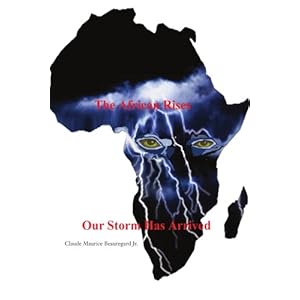"The African Rises" by Claude M. Beauregard (2002).
Related:
Description of the novel, "The African Rises" (Amazon.com):
The African Rises is a fictional story drawing on past and present historic material. It takes a unique approach to examining how power is used by a minority to maintain their control over the vast resources of Africa in the post modern world. It does so using a modern interpretation of the trilogy of Ausar, Aset and Heru sometimes referred to as the Ausarian drama and the struggle for power between Ausar and his evil Brother Set in ancient Egypt.An excerpt from the novel, "The African Rises":
"The Southern African Alliance and Sekhem turn their attention to Egypt. Forces in the government have proven that they are not willing to cooperate by allowing the Nubians their dignity. They continue to force them into overcrowded reservation camps and deny them the right to practice their religion freely. Unfortunately for Egypt, its survival is still tied to the Nile---the only river in the world that flows from south to north. Sekhem understands, like his fellow Nubians, that the Nile is sacred. But they know that a greater goal is at stake; so, the Southern African Alliance dams the Nile at Delgo in the Sudan. The Arab Egyptian government files protest after protest with the other governments of the world. The United States and Great Britain file one, but no one cares to listen. Their position of power and influence in Africa is nonexistent. The redeveloping countries stand fast behind the Southern African Alliance, now called the United African Alliance to honor the addition of the western and northern African nations. They let the Egyptian government sweat it out, for a week and to further their confusion, the Neb-Abui bombs the Aswan Dam and sends water gushing down the Nile beyond Lake Nasser into the Mediterranean Sea.Egyptians want action against Ethiopia's Nile dam plan. Source: enewschannel. (June 11).
Amist the confusion, United African Alliance forces move into Egypt up to Asyut. The U.N still a lackey for western interests protests this action and the U.S which has a defense treaty with Egypt comes to its aid as does Britain and France. The United African Alliance was prepared for this. The U.S unable to use seaports on African soil except for Egypt, must use resources elsewhere. Its ships in the Red Sea are sitting ducks with nowhere to maneuver and nowhere to hide. The Mediterranean offers them some hope. The battle begins. The U.S and allied forces launch their aircrafts and begin shelling the positions held by United African Alliance forces in Egypt. The United African Alliance responds; but, its attack is the last blow in what would have normally been a long battle. It launches its missiles and the radar of the U.S and allied ships lock in on them. Just as expected and that was their first mistake. They destroy the incoming missiles. But when that radar signal came back, it brought something else with it---a virus that has infected their computerized weapon systems. Their radar screens begin going blank and their missile systems go haywire by turning in every direction, but the right one. Fortunately for Greece, Turkey and Italy, none of them launches. The United African Alliance launches another group of missiles. The aircraft carriers can do nothing, but wait for them to hit.
They draw closer until finally, impact. "Nekhebet-Uatchet," is the word that is heard; but, nothing happens, at least anything immediately noticeable to the human eye. They look around at each other not knowing what to say; but, happy to still be alive and thinking falsely that the missiles have failed in their objective. They have not. Crew members are pulled towards the body of the ship that is now magnetized. Watches, belt buckles, etc., are drawn to its enormous structure. The weapon systems that were going haywire have now completely shutdown. Their guns are permanently silenced. The air force is taking tremendous losses, but then again, they never stood a chance. Just as everyone else in the allied military machine, over dependency on computer is their downfall. The so-called stealth bomber is not so stealthy when you have a radar system that can lock in on its electromagnetic energy signature. An aerodynamically unstable plane knock out the computer used to control it and it falls apart like a toothpick airplane smashing into a brick wall." (Source: Claude M. Beauregard. The African Rises. Published by iUniverse, Inc. 2002. From the chapter "End Game." Pg. 167-68).
Egyptians Furious Over Ethiopia Dam. Source: VOAvideo (June 11).
